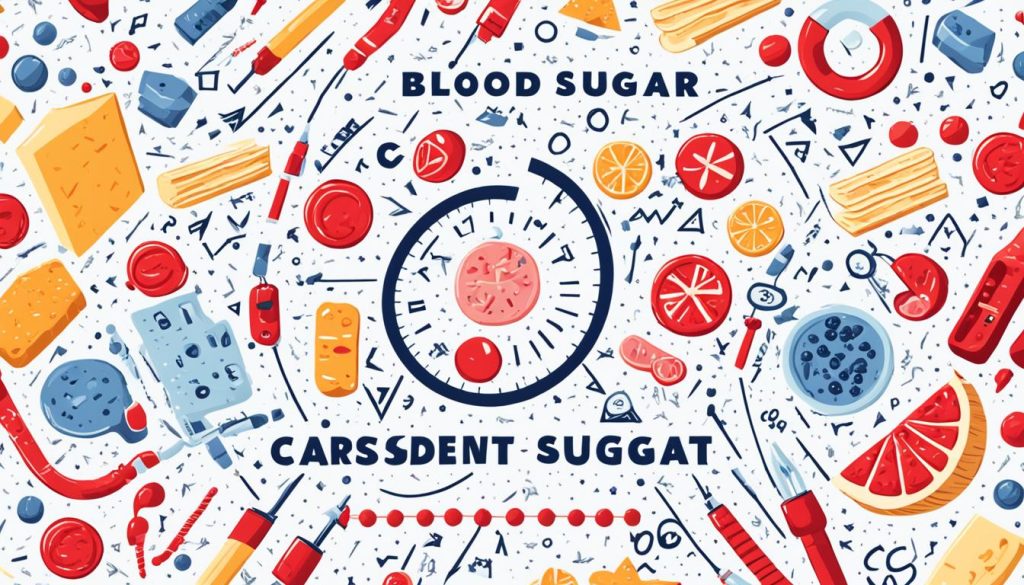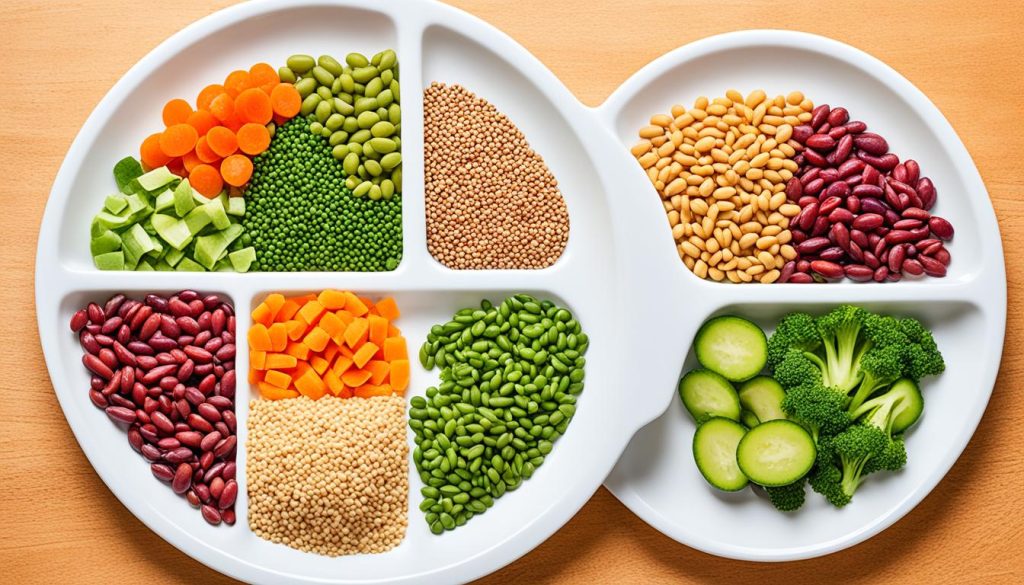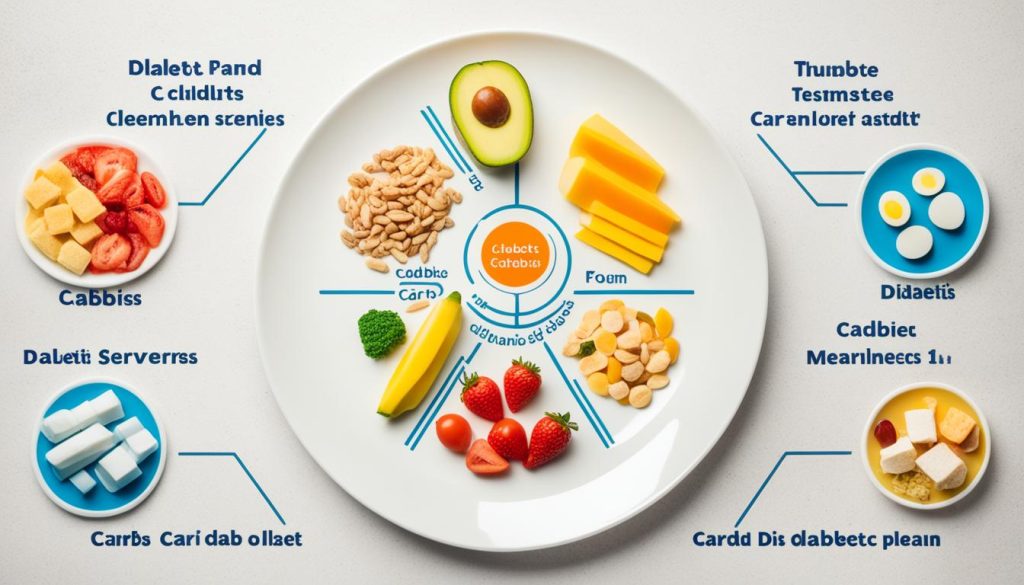Managing carb intake is essential for effective diabetes management. If you have diabetes, you may wonder how many carbs you should consume each day to keep your blood sugar levels in check. This article will provide you with guidelines on diabetic carb intake and daily carb limits to help you make informed choices about your diet.
As an individualized approach is crucial, the traditional dietary recommendation of getting 45-65% of daily calories from carbs may not be suitable for all diabetics. Recent advice from experts suggests a lower intake, often less than half the traditional guideline. Counting carbs can help you stay within your recommended range and achieve better blood sugar control.
Understanding the different types of carbs and their impact on blood sugar levels is key to managing your diabetes. There are three main types: sugars, starches, and fiber. Each type affects blood sugar levels differently, and learning which foods contain these carbs can help you make healthier choices.
The American Diabetes Association (ADA) used to advocate for a fixed percentage of daily calories from carbs for people with diabetes. However, they now emphasize an individualized approach, considering factors such as personal preferences and metabolic goals. Finding the carb intake that works best for you and is sustainable in the long term is crucial.
To determine the optimal carb intake for managing your diabetes, it’s important to measure your blood sugar levels before and after meals. By tracking your levels, you can better understand how different carb amounts affect your blood sugar. It’s also important to consider other factors such as activity level, weight, and insulin or medication usage when determining your carb intake.
Studies have shown that carb restriction can be beneficial for managing diabetes. Very low carb ketogenic diets, with less than 50 grams of total carbs per day, have been shown to reduce blood sugar levels, promote weight loss, and improve heart health. However, it’s essential to find the right balance and consult with your healthcare professional before making significant dietary changes.
There’s no one-size-fits-all recommendation for how many carbs individuals with diabetes should consume. Working with a healthcare professional is crucial in establishing the optimal carb intake that suits your specific needs. By managing your carb intake effectively, you can take control of your blood sugar levels and improve your overall health and well-being.
Different Types of Carbs and Their Impact on Blood Sugar
When it comes to managing carbs for diabetics, understanding the different types of carbs and their impact on blood sugar is crucial. Carbohydrates are one of the macronutrients found in food, and they provide energy for the body. However, not all carbs are created equal, and some can have a greater effect on blood sugar levels than others.
There are three main types of carbs: sugars, starches, and fiber. Sugar is found naturally in foods and beverages like whole fruit, juice, and milk products, as well as added to processed foods. Starches are found in foods like potatoes, corn, and whole grain breads and pastas. Lastly, fiber is found in foods like Nuts, whole grains, fruits and vegetables.
When it comes to diabetes control, it’s important to pay attention to carbohydrate intake, especially from sugars and starches. Consuming too many of these types of carbs can cause blood sugar levels to spike, which can be problematic for individuals with diabetes.

It’s worth noting that not all carbs are off-limits for diabetics. In fact, incorporating healthy sources of carbs, such as those found in fruits, vegetables, and whole grains, can provide essential nutrients and contribute to overall health. The key is to manage the amount and type of carbs consumed to maintain stable blood sugar levels.
Effect of Different Carbs on Blood Sugar Levels
The impact of carbs on blood sugar levels varies depending on factors such as the type of carb, portion size, and individual response. Simple carbs, such as refined sugars found in candy and sugary drinks, tend to cause a rapid rise in blood sugar levels. On the other hand, complex carbs like those found in whole grains and high-fiber foods are broken down more slowly, resulting in a slower and more gradual release of glucose into the bloodstream.
It’s important for diabetics to be mindful of their carb choices and consider the glycemic index (GI) of foods. The GI is a measure of how quickly a carbohydrate-containing food raises blood sugar levels. Foods with a high GI, such as white bread and sugary cereals, should be consumed in moderation, while those with a low or medium GI, such as most fruits and vegetables, can be included in a balanced diet.
Carbohydrate Guidelines for Diabetics
Carbohydrate guidelines for diabetics can vary depending on individual factors such as age, weight, activity level, and overall health. It’s important for individuals with diabetes to work with a healthcare professional or registered dietitian to develop a personalized carbohydrate plan that meets their specific needs.
However, as a general guideline, the American Diabetes Association (ADA) recommends that carbs make up about 45-60% of total daily calories for most people with diabetes. This can be further refined and tailored based on individual preferences and blood sugar management goals. Counting carbs and practicing portion control can help individuals with diabetes manage their carb intake effectively.
It’s important to remember that managing carbs for diabetics is just one aspect of diabetes control. A well-rounded approach that includes regular physical activity, monitoring blood sugar levels, and medication management is crucial for overall diabetes management.
How Many Carbs Should a Diabetic Have in a Day?
The American Diabetes Association (ADA) used to recommend that people with diabetes get around 45% of their calories from carbs. However, they now promote an individualized approach, taking into account dietary preferences and metabolic goals. It’s important to find the number of carbs at which a person with diabetes feels best and can realistically maintain in the long term.
Severely restricting carb intake to less than 50 grams per day can have dramatic results and may reduce or eliminate the need for insulin or diabetes medication. To help you make informed choices, here is a list of recommended carbs for diabetics:
| Carbohydrate Source | Carbohydrate Content (per serving) |
|---|---|
| Whole-wheat bread | 15 grams |
| Brown rice | 45 grams |
| Quinoa | 20 grams |
| Sweet potato | 25 grams |
| Steel-cut oats | 27 grams |
| Strawberries | 11 grams |
| Broccoli | 6 grams |
| Almonds | 6 grams |
Remember to work with a healthcare professional or a registered dietitian to create a personalized diabetic nutrition plan that suits your needs and goals.

Determining Optimal Carb Intake for Diabetes Management
To effectively manage carb intake for diabetes, it is crucial to determine the optimal amount that works best for each individual. This can be done by measuring blood sugar levels before a meal and again 1-2 hours after eating. By monitoring these levels, individuals can gain insights into how different amounts of carbohydrates impact their blood sugar.
The recommended maximum blood sugar level after eating is 180 mg/dL or 10 mmol/L. However, aiming for an even lower ceiling may be beneficial, especially for individuals who want to maintain tighter control over their blood sugar levels. Adjusting carb intake based on individual response and factors like activity level, weight, and insulin or medication usage may be necessary to achieve optimal results.
Carb counting is a helpful strategy for individuals with diabetes to better manage their carbohydrate intake. By keeping track of the number of carbs consumed, individuals can make informed decisions about their meals and adjust their intake accordingly to maintain stable blood sugar levels.

Carb Restriction as a Strategy for Diabetes Management
When it comes to managing diabetes, carb restriction has shown great promise in improving blood sugar control and overall health. Numerous studies have demonstrated the effectiveness of low carb diets in reducing blood sugar levels, promoting weight loss, and enhancing cardiovascular health.
One approach that has gained significant attention is the very low carb ketogenic diet. This diet involves drastically reducing carbohydrate intake to fewer than 50 grams of total carbs per day. By restricting carbs to this extent, individuals with diabetes can achieve significant improvements in blood sugar control and insulin sensitivity.

This image provides a visual representation of the daily carb limit for diabetes.
Furthermore, low carb diets that restrict carbs to a range of 50-100 grams per day have also demonstrated positive results in individuals with type 1 and type 2 diabetes. These diets allow for a greater variety of food options while still ensuring effective blood sugar management.
Benefits of Carb Restriction for Diabetes Management
- Significantly reduces blood sugar levels
- Promotes weight loss
- Improves cardiovascular health
- Enhances insulin sensitivity
Finding the Right Balance
It is important to note that the optimal carb intake for diabetes management may vary from person to person. Each individual’s needs and preferences should be taken into consideration when determining the ideal balance.
Consulting with a healthcare professional, such as a registered dietitian or endocrinologist, can help guide individuals in finding the appropriate daily carb limit for their unique circumstances. By tailoring carb restriction to one’s specific needs, it becomes easier to maintain blood sugar control and promote overall well-being.
| Carb Restriction Strategy | Daily Carb Limit |
|---|---|
| Very low carb ketogenic diet | Less than 50 grams of total carbs |
| Low carb diet | 50-100 grams of total carbs |
Conclusion
When it comes to managing diabetes, there is no one-size-fits-all recommendation for carbohydrate intake. It is crucial for individuals with diabetes to work closely with a healthcare professional to determine the optimal amount of carbs based on their specific needs and circumstances. By actively managing their carbohydrate intake, people with diabetes can effectively control their blood sugar levels and enhance their overall health and well-being.
One key aspect of managing carbohydrate intake is choosing healthy sources of carbs. This includes incorporating whole grains, fruits, vegetables, and legumes into the diet, while minimizing processed and sugary foods. Additionally, monitoring portion sizes is essential to maintain optimal blood sugar control.
For individuals who are on insulin or other diabetes medications, adjusting the dosage as needed is crucial when modifying carbohydrate intake. Regular blood sugar monitoring, in consultation with a healthcare professional, is vital to ensure the right balance between carb intake and medication. By working closely with their healthcare team, individuals with diabetes can achieve successful diabetes management and improve their overall quality of life.




